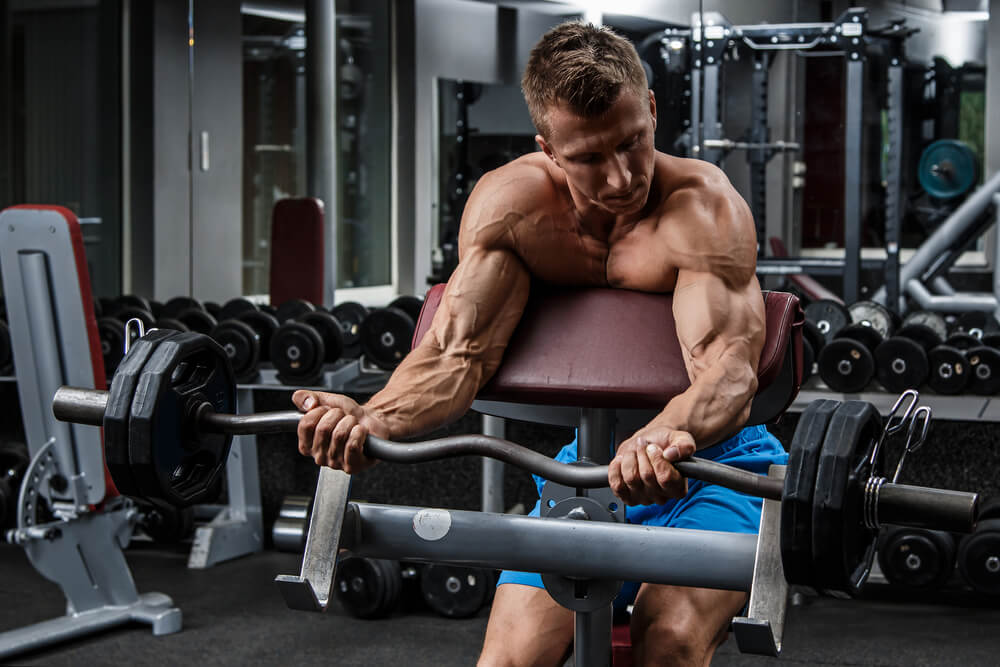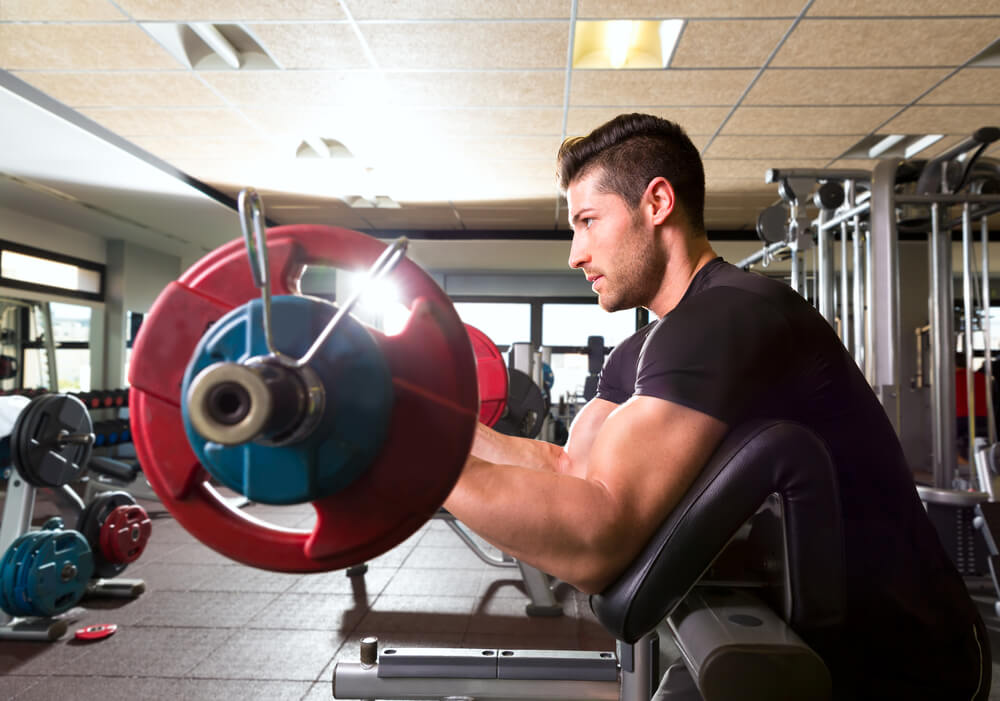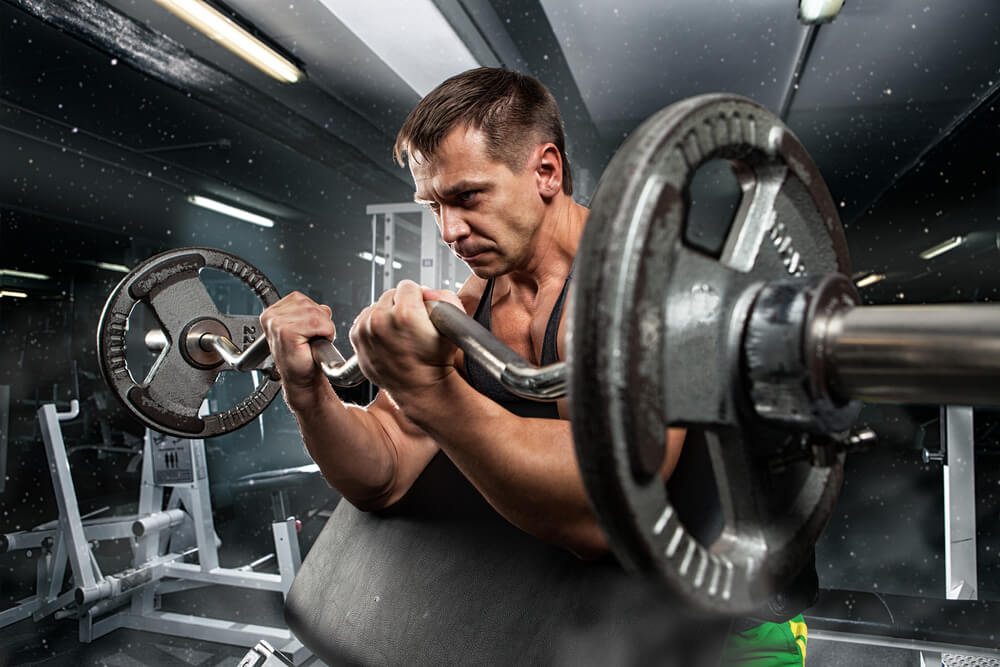When you are training your biceps, just doing some more reps and sets won’t cut it. Many lifters are hitting the same parts of the biceps over and over and are leaving out or under stimulating other parts. You need to hit both the short head and long head of the biceps in order to properly trigger muscles. This is where spider curls come in as the last move in your arm workout.
What Is a Spider Curl?
The curl is an old training staple but there are variations of it that can help work your muscles even more. A spider curl is where you lean over an inclined bench and let your arms hang straight down. This targets the short head of the muscle. The advantage of spider curls over other curls is constant tension, especially at the top portion. The slower negative allows more time under tension to work at a higher intensity. The higher intensity will mean greater stress, which can then mean greater adaptation.
How Does a Spider Curl Work the Muscle?
The bicep is a two-headed muscle that will lie between your forearm and shoulder. There are two heads that are often referred to as the short head and the long head because of the length. The long head is located on the outside of the arm and is responsible for the way your biceps look when viewed from the side and behind. The short head is on the inside of the arm and gives your biceps size and thickness. The spider curl is more of an oscillation movement when compared to other types of curls.
What Are the Benefits of Spider Curls?
There are a number of benefits of spider curls and it’s one of the most effective exercises for those who want to trigger and stimulate the biceps during a workout.
Increased RoM: Since the position of the barbell while doing a spider curl is unique, it allows this exercise to have a larger range of motion from beginning to end. A larger range of motion will give higher efficiency of the movement, a greater likelihood of size gain, and will prevent injury.
Time under Tension: Due to the amount of tension that can be applied throughout the whole exercise, spider curls are a favorable biceps exercise. Muscle tension will lead to muscle stress and the stress will lead to muscle adaptation. Applying an emphasized eccentric can also only enhance this tension.
Muscle Symmetry: There is a lot of emphasis on developing the biceps peak by using long head movements, but short head movements, such as the spider curl, will create a more symmetrical look to the arm. The two heads of the biceps are jointed and become one muscle so it doesn’t make sense to train one and not the other or not train them equally. If they aren’t trained equally there will be a muscle imbalance that affects performance and the aesthetic look.
What Equipment Do You Need for a Spider Curl?
A spider curl can be performed practically anywhere and all you need is a bench, a barbell, or a set of dumbbells. You also want to learn the correct form and technique. Some gyms will have a spider curl bench but if you don’t have one, you can also use a preacher curl bench. Look for a preacher bench that is padded on both sides. If you don’t work out at the gym and instead do so at home, you should be able to find one that is relatively inexpensive or you can find similar equipment.
How Do You Properly Do a Spider Curl?
Don’t settle for bad form and make sure you take the time to perfect your form. You want to really focus and pay attention to the subtleties of the movement. You could miss out on possible gains if you aren’t focused on every single squeeze or you aren’t approaching the move the right way. In order to properly do spider curls and not get injured, you will need to follow these steps:
1. Start by setting the bar on the part of the bench you would typically sit on. You want to be sure to align the barbell correctly so that it won’t fall off and is balanced.
2. Move to the front side of the bench, the part where arms usually lay, and position yourself to lay at a 45-degree angle with your stomach and torso pressed against the front side of the bench.
3. Feet, and especially toes, should be well-positioned on the floor. Then place your upper arms on top of the pad that is found on the inside part of the bench. The upper pad should be snug in your armpits.
4. Use your arms to grab the barbell with the palms facing up grip at about shoulder-width apart or slightly closer. Your grip for this exercise will matter. Holding your hands close together will target the outer head of the biceps, while the further apart your hands are will target your inner head. You can experiment with doing one set of curls with a closer grip and another set with a wider grip in order to make sure you hit both heads of the biceps.
5. Slowly begin to lift the barbell upwards and exhale. Be sure to hold the contracted position for a second and then squeeze the biceps. When doing this, you want to keep the upper arms stationary and curl the weight straight up as high as you can.
6. Bring the barbell back to the starting position slowly and be sure to breathe in.
7. Briefly pause before you then repeat for the recommended amount of reps for your set. What Are Some Tips for Spider Curls?
The bench is a tool that will allow you to find the right angle for your body, but it’s not a bed, so you shouldn’t be lying there and getting comfortable. Once you find the right angle, you want to create rigidity throughout the rest of the frame.
In order to isolate the biceps as much as possible, you want to keep the upper arm perpendicular to the ground for the set. This will make sure the biceps drive the entire curling motion. It can be tempting to let elbows shift forward, which involves the front shoulders and takes the emphasis off the biceps. If you do this, you miss the opportunity to really grow your biceps.
When you curl upwards, you want to work to twist the pinky as high as possible as if you are trying to get your palm to turn away from you. This will force your biceps to work much harder. By trying to twist your forearm so the pinky winds up high, it will emphasize a bit of contraction and make it a complete biceps motion.
Don’t forget the squeeze. Once you have curled up as high as you can without letting elbows twist or shift forward, you will feel a sensation in your biceps. You should use this and be sure to finish each rep by squeezing your biceps and building a strong muscle to mind connection.
You can also use dumbbells when you do spider curls. If using dumbbells, be sure to place the dumbbells on the part of the bench you would typically sit on properly. Doing a dumbbell spider curl can allow for more isolation and focus.
When doing a spider curl, try using a fat grip. One of the benefits of choosing a thicker handle is that it will stimulate more muscle activation in the forearms, upper arms, and hand. More muscle activation will mean bigger muscle strength gains.
You want to do a spider curl later in your biceps work, after working with heavier barbell and dumbbell curls. You should aim for three sets of 10-12 reps. If you want to build your biceps then it’s important to keep progressive overload in mind. Keep track of the weight you are using to curl and then increase it incrementally every week.
How Do You Avoid Mistakes with Spider Curls?
There are a number of mistakes you can make when doing spider curls that you want to avoid. Lack of Contractions: If too much weight is applied and combined with excessive momentum, the contraction of the spider curl can be ignored. It’s important to progressively overload your weights throughout training but it’s more important to create a enough stimulus on the muscle as well. In order to get this, you may have to lower the weight and focus on the correct tempo. You then want to add a short pause and squeeze at the top of the contraction.
Range of Motion: Your body isn’t technically in the way during spider curls so you can have a full range of motion. You should take advantage of this. By ignoring the full range of motion, this will only give you half the benefits and will be a less efficient movement. In order to prevent making this mistake, mentally cue yourself to fully lower and stretch the arm down before you curl it back upward. You can also have a training partner that will help you with your form throughout your set.
Be Sure to Include Variation: If you want to prevent your body from becoming complacent with arm training then you need to add some variety to a program. With arm workouts, it can be easy to just do the usual curls. When is the last time you have changed up the equipment you are using? When have you changed the angle you are training form? What about changing the number of sets or rest time? The spider curl can be varied so you can perform it using an EZ bar, cable curl, or barbell. Be sure to add variety to your spider curls in order to maximize results.
Position of Feet: It’s easy to fall off balance and lose stability if feet are placed firmly on the floor. To prevent this from happening, place your feet, toes in particular, into the ground and make sure they are comfortable before you lower yourself onto the bench completely.
Conclusion
A spider curl is a great exercise to add to your arm workout routine. The benefits of a spider curl include muscle symmetry, increased range of motion, and more tension in the muscle. Proper form is important in order to effectively use the move. There are different variations of spider curls that can use a barbell or dumbbells but no matter the method, proper form is essential. Be sure to follow some of the popular tips, including squeezing the muscle, in order to get the most out of it. There are some common mistakes you should avoid in order to avoid injury and ensure you get the most out of the exercise.
-Terry Asher
Terry Asher
Latest posts by Terry Asher (see all)
- Better Family – Product Review Liquid Daily 2 oz - Dec 16, 2024
- Post-Workout Recovery: The Key to Optimal Performance - Nov 25, 2024
- Pre-Workout Supplements – Everything You Need To Know - Nov 18, 2024













[…] post Triggering Biceps with Spider Curls appeared first on Gym […]
[…] Read The Entire Article By Terry Asher Here. […]
[…] Triggering Biceps with Spider Curls – Sep 24, 2019 […]
I am so happy to read this. This is the kind of manual that needs to be given and not the random misinformation that’s at the other blogs.
[…] of many athletes and fitness enthusiasts. In this blog, we will delve into the benefits of this curly spidertheir proper execution, and how they can contribute to stronger and more aesthetically appealing […]
[…] athletes and health fans’ exercise routines. On this weblog, we’ll delve into the advantages of spider curls, their correct execution, and the way they may also help you obtain stronger and extra […]
[…] and fitness enthusiasts’ workout routines. In this blog, we’ll delve into the benefits of spider curls, their proper execution, and how they can help you achieve stronger and more aesthetically […]
[…] athletes and health fans’ exercise routines. On this weblog, we’ll delve into the advantages of spider curls, their correct execution, and the way they might help you obtain stronger and extra aesthetically […]
[…] and fitness enthusiasts’ workout routines. In this blog, we’ll delve into the benefits of spider curls, their proper execution, and how they can help you achieve stronger and more aesthetically […]
Every time I visit this blog, I always find something new and unique. The articles cover a variety of topics, and the editorial team turns them into interesting and insightful articles.
[…] and fitness enthusiasts’ workout routines. In this blog, we’ll delve into the benefits of spider curls, their proper execution, and how they can help you achieve stronger and more aesthetically […]